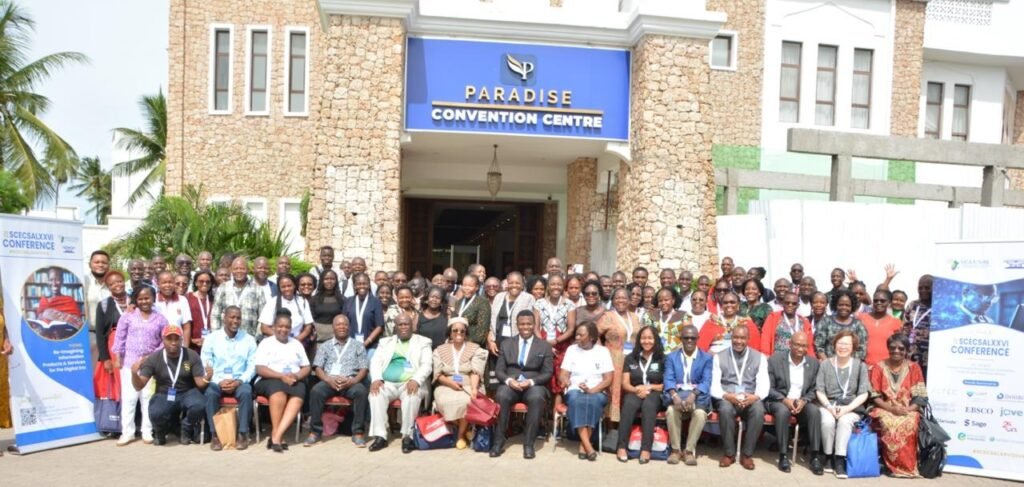Librarians from across Africa last week celebrated the golden jubilee of the Standing Conference of Eastern, Central and Southern African Library and Information Associations (SCECSAL), in a ceremony that saw participants celebrate different cultures through songs, dances, performances and even speeches.
SCECSAL, celebrated the jubilee with its 26th biennial conference at Pride Inn Paradise Beach Resort Convention Centre in Mombasa, Kenya.
The event was hosted by the Kenya Library Association and took place between April 22-26, 2024 with the theme “Reimagining information products and services for the digital era”.
Chief Guest of the ceremony, gender, culture, the arts and heritage cabinet secretary Aisha Jumwa, commended the Kenya Library Association’s efforts in advancing library standards.
The CS, in a speech read on her behalf by the director general and chief executive officer of Kenya National Library Services, Charles Nzivo, cited the validation of National Policy on Libraries, 2023, the Libraries Bill, 2023 and the Kenya National Library Services Bill, 2023 as some of the legislations pioneered to support the sector.
She said libraries play key roles in advancing education and the cultural panache of the country. SCECSAL is a regional forum for library and information associations in Africa, made up of the national library and information services associations of member countries.
The keynote address was delivered by Prof Clara M. Chu of the Mortenson Centre for International Library Programs, University of Illinois, Urbana-Champain, USA, who discussed the library as the centre of the community.
She challenged librarians and information workers to collaborate more, work as teams, engage in active learning, and be strategic planners to impact societies in order to reimagine library products and services.
The impact of libraries was demonstrated by various library organisations that have established community and school libraries in the region.
The Chair of the Local Organising Committee, Muthoni Kibandi, introduced the more than 15 nationalities represented in the conference.
Some of the national organisations present were South Africa, Eswatini, Lesotho, Namibia, Botswana, Zambia, Zimbabwe, Malawi, Tanzania, Uganda and Kenya, and delegates from outside of Africa.
The president of the Kenya Library Association, Prof Peter Gatiti, the Associate Vice-Provost and University Librarian at Aga Khan University, becomes the Chair of the SCESCAL Council.
In welcoming the delegates to Kenya, Prof Gatiti encouraged the information professionals to deepen their understanding of current trends and best practices and inspire new ideas and collaborative ventures that will propel the library profession forward.
A major achievement is that the biennial conference has consistently taken place as scheduled, and the publication of its conference proceedings has been maintained. The delegates proposed to expand SCECSAL to include Francophone and Lusophone nations.
The crown of the event was the cultural night, where different nationalities showcased their cultures with music, dances and storytelling.
The gala was won by the dazzling Library and Information Association of Zambia (LIAZ) with an excellent recitation and cultural song – the fourth time they have won the event, affirming their prowess.
The guest of Honour for the gala night was Hon. Dr Joseph Mussaji, Zambian Member of Parliament, who had also joined the event in support of his librarian wife and former president of LIAZ, Prof Musajji.
He was joined by Mombasa County Executive Member for Education, Dr Bwarali Kaame, and the CEO/Secretary of Kenya Heroes Council, Mr Charles O. Wambia, O.G.W.
Some other notable delegates at the conference were librarian emeritus Prof Kay Ratseraka of Namibia, Prof Maria Musoke, Vice Chancellor, Kyambogo University in Uganda, Mrs Jacinta Were, formerly of the University of Nairobi and Dr Justin Chisenga from Zambia.
The conference concluded with a SCECSAL General Assembly, in which the delegates resolved to strengthen their national organisations, improve the quality of library and information training, and continue innovating new information products and services to equip and serve users better.
Librarians agreed to ensure access to relevant information to attain the 2030 Sustainable Development Goals to mitigate socioeconomic challenges facing sub-Saharan Africa.


